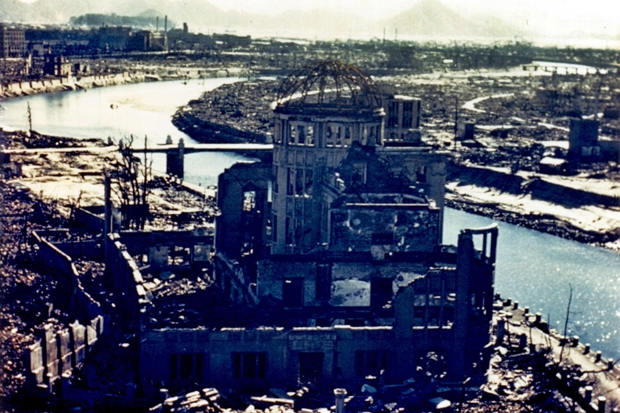The 70th anniversary of Hiroshima and Nagasaki has produced some predictable wailing and gnashing of teeth about the horrors of nuclear weapons. The Guardian called the dropping of the bombs ‘obscene’, citing the figure of 250,000 casualties, and CND organised a commemorative event where Jeremy Corbyn renewed his call for unilateral nuclear disarmament.
As a conservative and a realist, I don’t have the luxury of moral certainty. Was Harry Truman wrong to take the decision he did? On 16 August 1945, Winston Churchill defended him in a speech in the House of Commons, making what has since become the standard case. Yes, Japan would have been defeated eventually, but the bombings brought the second world war to an end without the need for a land invasion. In Churchill’s estimation, that would have led to the loss of a million American lives and 250,000 British, Canadian and Australian servicemen.
Critics of the bombings dispute those figures, pointing out that Truman received conflicting advice about the likely American casualties. But does the rightness or wrongness of the decision turn on whether it produced a net saving of lives? Even if the bombings indisputably produced a net loss, that wouldn’t necessarily make them wrong. Truman wouldn’t have been much of a president if he’d attached the same weight to Japanese lives as he had to those of his own people. His first priority was not to minimise the loss of human life per se, but to make sure America won the war, with as few American lives as possible being lost in the process.
OK, so that was his duty as president, but what about his moral duty as a human being? Even there, I think you have to take the historical context into account. Let’s not forget that Japan was the aggressor, not America. The Japanese Imperial Army forced America into the war by launching a surprise attack on Pearl Harbor, killing 2,403 Americans and wounding a further 1,178. Before that, Japan had proved its bona fides as an expansionist imperial power, invading Manchuria, French Indochina and China. In the Rape of Nanking, Japanese troops murdered up to 300,000 civilians and enemy combatants.
The point here isn’t that Japanese soldiers and their political masters murdered more people than were killed in Hiroshima or Nagasaki — although they did — but that they brought their misfortune on themselves. The person who should be held chiefly responsible for the deaths caused by the atomic bombs isn’t President Truman, but Emperor Hirohito. If you declare war on another country and demonstrate over and over again that there’s no atrocity you won’t commit in order to win, you cannot blame your opponent for using every means at its disposal to defend itself.
As for the objection that the overwhelming majority of the casualties in Hiroshima and Nagasaki were civilians, I’m not convinced. George MacDonald Fraser deals with this point in Quartered Safe Out Here, his superb second world war memoir in which he describes his experiences as a 19-year-old private in the Border Regiment fighting against the Imperial Japanese Army in Burma. Fraser recounts an argument he had with a man in a pub who denounced the bombings as an ‘obscenity’. The linchpin of his opponent’s case was that the victims were civilians.
‘I did not pursue the question of whether the lives of your own soldiers should be sacrificed for the safety of enemy civilians, because if you get into that particular moral jungle you’ll never come out,’ he writes. ‘But I did point out that we were, in fact, civilians, too — civilians in uniform, and could he understand our possible resentment that people whose lives and liberties we had been fighting to protect (him, in fact) should be ready to expend us for the sake of Japanese?’
None of which means I’m sure Truman was right. It’s one thing justifying the dropping of the first atomic bomb. But did America really have to drop a second three days later? Surely a single demonstration of its new weapon would have been enough to force Japan’s surrender? Here you get into the realm of historical counter–factuals, speculating about the impact of the bombs on halting Stalin’s advance into Eastern Europe — both bombs, since the second proved the accuracy of the first wasn’t a fluke.
It starts to get pretty murky at this point, but if I’m forced to pick a side I’ll stick with Harry Truman.







Comments